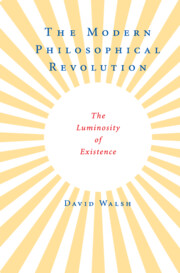Book contents
- Frontmatter
- Contents
- Preface
- Introduction
- 1 Kant's “Copernican Revolution” as Existential
- 2 Hegel's Inauguration of the Language of Existence
- 3 Schelling on the Beyond of Existence
- 4 Nietzsche: Philosophy as Existence
- 5 Heidegger's Achievement Despite the Betrayal of Philosophical Existence
- 6 Existence Without Refuge as the Response of Levinas
- 7 Derrida's Dissemination of Existence as Différance
- 8 Kierkegaard's Prioritization of Existence over Philosophy
- Epilogue: Modernity as Responsibility
- Works Cited
- Select Bibliography of Secondary Sources
- Index
2 - Hegel's Inauguration of the Language of Existence
Published online by Cambridge University Press: 05 June 2012
- Frontmatter
- Contents
- Preface
- Introduction
- 1 Kant's “Copernican Revolution” as Existential
- 2 Hegel's Inauguration of the Language of Existence
- 3 Schelling on the Beyond of Existence
- 4 Nietzsche: Philosophy as Existence
- 5 Heidegger's Achievement Despite the Betrayal of Philosophical Existence
- 6 Existence Without Refuge as the Response of Levinas
- 7 Derrida's Dissemination of Existence as Différance
- 8 Kierkegaard's Prioritization of Existence over Philosophy
- Epilogue: Modernity as Responsibility
- Works Cited
- Select Bibliography of Secondary Sources
- Index
Summary
If Kant was the one who brought about the revolution in philosophy that is its modern achievement, Hegel was the one who made the event explicit. This is why we are inclined to see Hegel as the point of reference for the subsequent history of thought. We forget that Kant was the inaugurator of the existential perspective, in large part because he never fully confronted its implications. Hegel by contrast was a more far-reaching thinker, one who was not reluctant to admit his own epochal significance and hint at an even higher status. The megalomania of the nineteenth century was in the air. Yet philosophy was not absorbed by the enthusiasm that surrounded it. Hegel may have been carried away by the prospect of making the turn toward inwardness a permanent achievement, capturing it within the definitiveness of the system, but this did not prevent him from furnishing the means by which the excesses would be resisted and reversed. Hegel thus turned out to be the pivotal thinker, although his significance was other than what he often seemed to indicate. The ironic role of Hegel in the movement of modern philosophy consists in the development of the instruments by which his own missteps have been corrected. This explains the extraordinary prominence he holds for those who came after him. Responses to Hegel are the vehicle by which the unfolding of modern philosophy proceeds because he so thoroughly supplied the instruments of his own critique.
- Type
- Chapter
- Information
- The Modern Philosophical RevolutionThe Luminosity of Existence, pp. 76 - 129Publisher: Cambridge University PressPrint publication year: 2008



